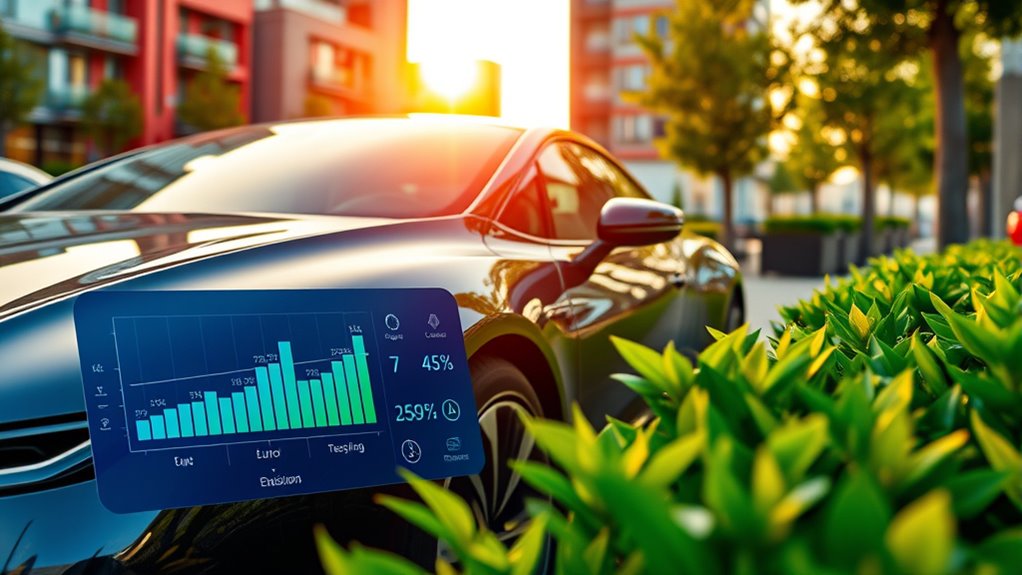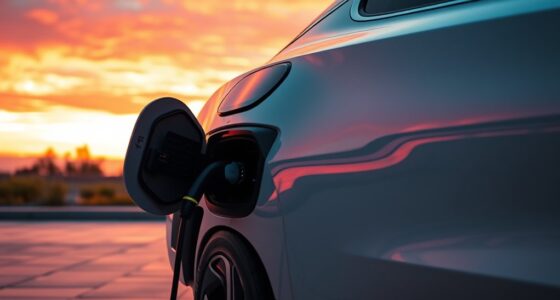Euro 7 emission standards will change how cars are made by enforcing stricter limits on pollutants. This means automakers will invest in cleaner technologies, giving you more choices for eco-friendly vehicles. You’ll likely see a shift towards electric and hybrid models, making it easier to pick a greener option. While initial costs may rise, long-term savings on fuel and repairs could benefit you. Stick around to discover how this impacts the industry and your vehicle options.
Key Takeaways
- Euro 7 introduces stricter emissions limits, targeting nitrogen oxides and particulate matter to improve air quality and combat climate change.
- Automakers must invest in advanced technology to meet the new standards, promoting the development of cleaner, more efficient vehicles.
- Consumers will see an increased availability of electric and hybrid models, influencing their vehicle choices based on environmental standards.
- The regulations aim to enhance public health by reducing greenhouse gas emissions and improving overall air quality.
- While initial costs may rise due to advanced tech, long-term savings from fuel efficiency and lower maintenance can benefit consumers.

Have you ever wondered how your car’s emissions impact the environment? As a driver, you may not think about it daily, but your vehicle plays a significant role in air quality and climate change. The introduction of Euro Emission Standards, especially the upcoming Euro 7 regulations, aims to tackle this issue head-on. These standards are designed to reduce harmful pollutants from vehicles, pushing manufacturers to improve their vehicle technology for cleaner emissions.
Euro 7 is set to be a game changer in the automotive industry. It’s not just about lowering emissions; it’s about enforcing stricter limits on nitrogen oxides, particulate matter, and other harmful substances. You’ll notice that many automakers are already investing heavily in advanced vehicle technology to meet these new requirements. This means cleaner cars on the road, which in turn leads to a healthier environment for everyone. If you’re in the market for a new vehicle, understanding these standards can help you make more informed choices about which models to consider.
Euro 7 will transform the automotive industry with stricter emissions limits, paving the way for cleaner, healthier vehicles on our roads.
With Euro 7, the European Union is responding to growing environmental concerns and public pressure for cleaner air. These new environmental policies will not only affect manufacturers but also impact you as a consumer. As stricter standards roll out, you could find that cleaner vehicles are more readily available, and the market will likely shift toward electric and hybrid models. This shift is vital in reducing greenhouse gas emissions and combating climate change.
You might also be wondering how these standards influence vehicle pricing. While it’s true that implementing advanced vehicle technology can increase production costs, these investments often lead to more efficient engines and lower running costs in the long run. In other words, the upfront price might be higher, but you could save money on fuel and repairs later. Plus, many governments offer incentives for environmentally friendly vehicles, making them more accessible for you.
Ultimately, Euro 7 is about creating a sustainable future. As a driver, you have the power to support these changes by choosing vehicles that comply with these new regulations. By understanding the implications of Euro Emission Standards, you’re not just making a choice for yourself; you’re contributing to a cleaner, healthier planet for everyone. So, the next time you’re in the market for a new car, keep these standards in mind. They’re shaping the future of the automotive industry and the world we live in.
Frequently Asked Questions
How Do Euro 7 Standards Impact Electric Vehicles?
Euro 7 standards primarily impact electric vehicles by pushing for battery innovation and improved charging infrastructure. These regulations encourage manufacturers to enhance battery efficiency and longevity while ensuring charging stations are more accessible and widespread. You’ll find that as these standards evolve, more emphasis will be placed on sustainable technologies, making electric vehicles even more attractive. Overall, Euro 7 aims to create a cleaner, more efficient environment for all types of vehicles, including EVs.
What Is the Timeline for Euro 7 Implementation?
The Euro 7 implementation timeline’s like a rollercoaster ride, with twists and turns galore! You’ll see new emission testing standards rolling out in mid-2025, followed by regulatory deadlines that’ll keep manufacturers on their toes. By 2027, all vehicles must comply, or they’ll be left in the dust! So, buckle up and stay informed, because these changes are racing toward you faster than a speeding car on the autobahn!
Are There Penalties for Non-Compliance With Euro 7?
Yes, there are penalties for non-compliance with Euro 7 standards. If you don’t meet the requirements, authorities can impose fines or restrict vehicle sales, leading to significant compliance costs. This enforcement is aimed at ensuring that manufacturers adhere to the regulations, promoting cleaner air and reducing emissions. Staying informed about these penalties will help you avoid costly repercussions and maintain a competitive edge in the automotive market.
How Do Euro 7 Standards Differ From Previous Euro Standards?
Euro 7 standards tighten emission thresholds and update testing procedures compared to previous standards. You might wonder how this impacts your driving experience. With stricter limits on nitrogen oxides and particulate matter, manufacturers must innovate more efficient technologies. These changes aim to reduce air pollution and enhance environmental protection, pushing carmakers to adopt cleaner solutions. Ultimately, you’ll notice cleaner air and potentially improved vehicle performance with Euro 7 compliance.
Will Euro 7 Affect Vehicle Prices for Consumers?
Yes, Euro 7 will likely affect vehicle prices for consumers. As manufacturers invest in cleaner technologies to meet these stricter standards, you might see an increase in market pricing. This could impact vehicle affordability, especially for new models. However, the long-term benefits of cleaner air and potentially lower running costs for efficient vehicles could balance out the initial price hike you might encounter when shopping for a new car.
Conclusion
As we stand on the brink of Euro 7, the stakes couldn’t be higher for car manufacturers and drivers alike. Will these new standards revolutionize the way we drive, or will they create unforeseen challenges? With stricter limits on pollutants and a push for greener technology, the choices you make today could shape the future of our roads. Buckle up—this journey is just getting started, and the impact of Euro 7 is about to unfold in ways you never expected.










